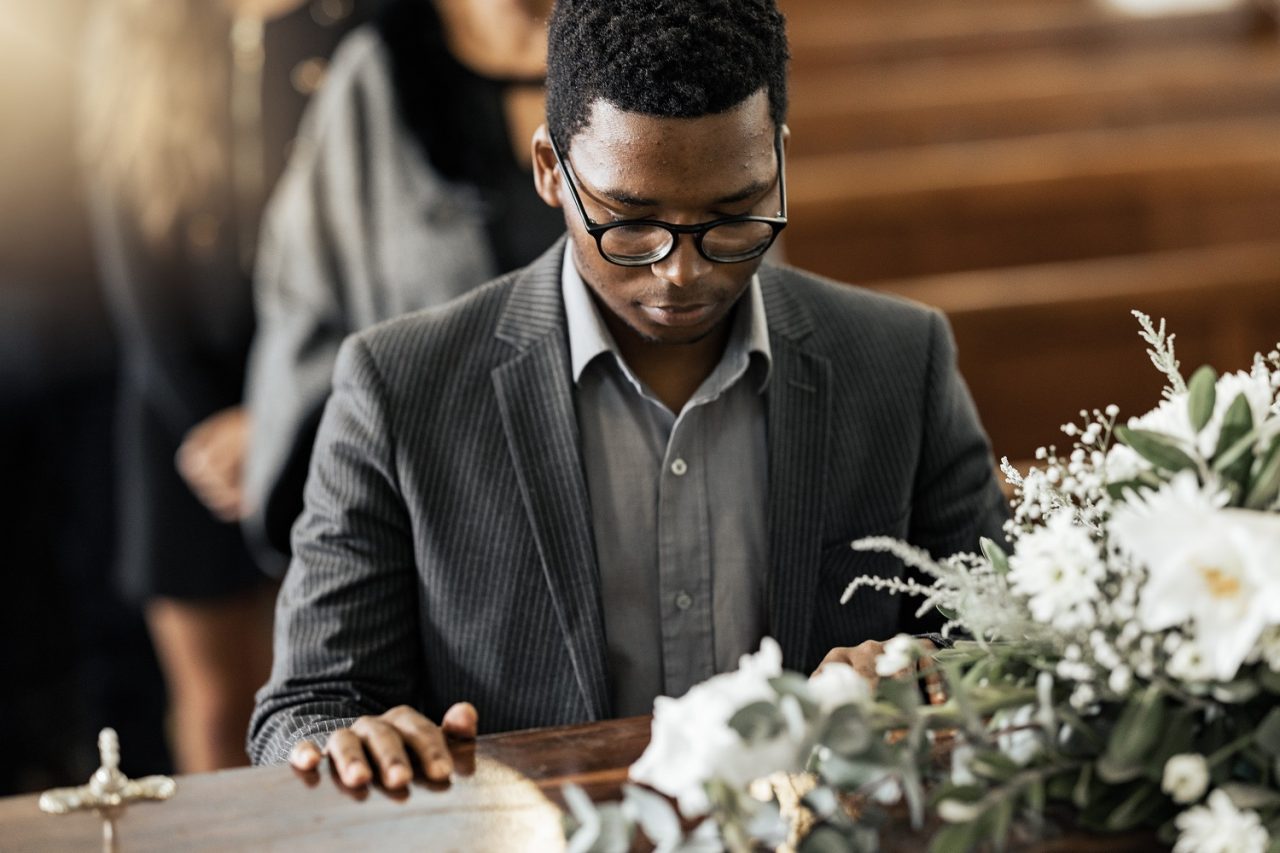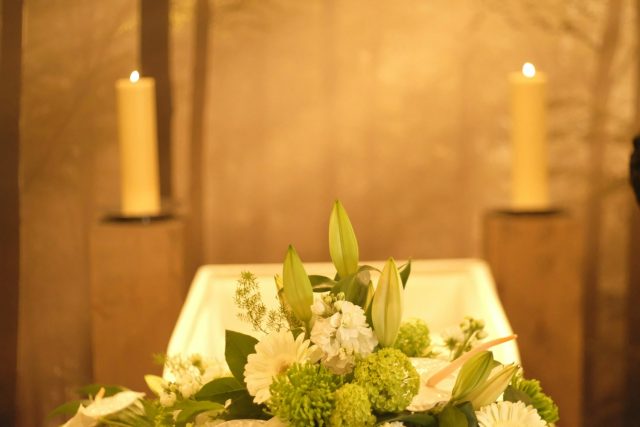
Choosing a memorial stone for a loved one is a deeply personal and significant decision. It’s a symbol of your love and respect for the unique personality of the individual who has passed away. Read on for help in how to navigate your options when making your choice.
Understanding your emotions
Before diving into the options, it’s important to acknowledge your feelings. Grief can be overwhelming and the process of selecting a memorial stone should be approached with care. Give yourself time and space to reflect on what will best honour the memory of your loved one.
Type of stone
Memorial stones come in a variety of materials, each with its own characteristics and symbolism. Also, consider the environment where the stone will be placed and the level of maintenance you’re comfortable with when choosing a material.
Granite
Durable and traditional, granite is a popular choice. It withstands harsh weather and retains its beauty over time.
Marble
Known for its elegant appearance, marble is a softer stone and can weather more over time.
Bronze
Often used for plaques and combined with other materials, bronze gives a timeless and classic look.
Personalising the tribute
Personalising a memorial stone makes it more than just a marker – it becomes a personal tribute to their life and the special bond you shared. Let’s have a look at some ways to do this.
Engravings and inscriptions
Pick words that meant a lot to your loved one or show who they were. This could be a quote they loved, a simple message, or their name and important dates. Also, think about the style of the writing – fancy, bold, or plain – as this can also show their personality.
Symbols and images
Icons such as religious symbols, flowers, or even custom imagery can add a unique touch. Think about symbols that held special significance or brought joy to your loved one, as these can be a powerful reminder of their passions and beliefs.
Shape and design
From traditional rectangles to more bespoke shapes like hearts or books, the stone’s shape can reflect the personality of your loved one. Also, the texture and finish of the stone can add another layer of meaning.
Remember to consider:
Size and budget
Memorial stones come in various sizes and designs, impacting the cost. Set a realistic budget and remember that the value of the stone lies in its sentiment, not its price. Work with your funeral service to find the perfect tribute within your budget.
Regulations and permissions
Check with the cemetery or memorial site for any regulations regarding size, material, or installation. Some places have specific guidelines that must be followed, so it’s important to be informed before making your final decision.
Selecting the perfect memorial stone
When a loved one dies, deciding on a memorial can be a tough emotional challenge, but we’re here to help. Our team at Jamieson Funeral Services will guide you in choosing designs, stones and inscriptions to honour your loved one, all while keeping your budget in mind.
Contact us on 0117 956 4796 to talk through your personal requirements and we can help ease the decision-making burden at this difficult time.
Related FAQs
- 7 Touching Memorial Poems for Grandad’s FuneralSaying goodbye to a beloved grandad is never easy. Whether he was a gentle storyteller, a steady hand through life’s ups and downs or the heart of the family, the… Read more: 7 Touching Memorial Poems for Grandad’s Funeral
- Can You Attend a Direct Cremation?Direct cremation has grown in popularity in recent years, especially for those looking for a simpler, more cost-effective alternative to a traditional funeral. With no formal service, no procession and… Read more: Can You Attend a Direct Cremation?
- 25 Memorial Plaque Ideas to Honour a Loved OneChoosing a memorial plaque is a tender and significant part of remembering someone you love. Whether it’s placed beside a grave, in a peaceful garden or on a favourite bench,… Read more: 25 Memorial Plaque Ideas to Honour a Loved One

Grief is a profound and complex experience, especially for children. Books can be a gentle and effective way to help these young minds understand and cope with the loss of a loved one. Here are five essential books that can support your child through their journey of grief:
1. “The Invisible String” by Patrice Karst
This book helps young kids aged 3-6 understand separation and loss in a simple way. It tells a story about an ‘invisible string’ connecting us to those we love, no matter the distance.
It’s a comforting idea for children dealing with loss, showing them that love keeps us connected even when we can’t see someone.
2. “The Paper Dolls” by Julia Donaldson
This book, great for 3-5-year-olds, is about a girl and her paper dolls having adventures together. But eventually, the dolls get torn. The story shows how memories last even when things are gone.
It teaches kids that memories of joy stay forever, even if physical things don’t. Written by the author of ‘The Gruffalo’, it’s very effective at helping children understand loss.
3. “Lost in the Clouds: A Gentle Story to Help Children Understand Death and Grief” by Tom Tinn-Disbury
This book tells a story about a young boy dealing with the loss of his mother. For ages 3 and up, it explores the various emotions children may feel when grieving, such as sadness, anger and confusion.
Offering an honest and gentle approach to explaining death and grief, it includes a non-fiction page that encourages conversation with your child through gentle questions. This makes it an invaluable resource for helping children understand and process their emotions.
4. “I Miss You: A First Look at Death” by Pat Thomas
This book is designed to help children ages 5-7 understand what death means and to deal with the feelings of loss and grief. It explains in simple terms why people die, addressing both the emotional and practical aspects of loss.
With a straightforward, factual approach, it can be particularly helpful for children who need clear explanations and a sense of understanding to help them through their grief. Special notes are also included at the back for parents and teachers, offering useful tips on how to use this book effectively.
5. “You Will Be Okay” by Julia Stokes
This book is a comforting resource for older children who have experienced the loss of a loved one. It offers reassurance and hope, focusing on the message that it’s okay to feel sad, but also that healing and happiness are possible in time.
The author is a clinical psychologist and founder of child bereavement charity, with years of experience of children going through grief. Targeted at ages 9-12, this book shares stories of bereaved people in order for children to relate and feel less alone in their grief.
Compassionate support with Jamieson Funeral Services
In your time of need, allow Jamieson Funeral Services to be a source of comfort and support. Contact us at directors@jamiesonfunerals.co.uk or call 0117 956 4796 to learn more about how we can help you navigate through your grief with care and dignity.
Related FAQs
- 7 Touching Memorial Poems for Grandad’s FuneralSaying goodbye to a beloved grandad is never easy. Whether he was a gentle storyteller, a steady hand through life’s ups and downs or the heart of the family, the… Read more: 7 Touching Memorial Poems for Grandad’s Funeral
- Can You Attend a Direct Cremation?Direct cremation has grown in popularity in recent years, especially for those looking for a simpler, more cost-effective alternative to a traditional funeral. With no formal service, no procession and… Read more: Can You Attend a Direct Cremation?
- 25 Memorial Plaque Ideas to Honour a Loved OneChoosing a memorial plaque is a tender and significant part of remembering someone you love. Whether it’s placed beside a grave, in a peaceful garden or on a favourite bench,… Read more: 25 Memorial Plaque Ideas to Honour a Loved One

If you’re planning a funeral for a loved one, it may be just as important to celebrate them as it is to remember them. One of the best ways to do so is by making their funeral unique to them.
From themes and colours to mementos and transportation, here are six ways that you can make your loved one’s funeral as quirky and individual as you’d like it to be.
6 ways to make a funeral unique
1. Theme the funeral
There are so many ways to theme a funeral, which makes this our top tip for staging a uniquely celebrative memorial.
Perhaps your loved one was a superfan of a band, or maybe they were known for a particular hobby. No matter what their passion was, you can theme a funeral in a way that they’d love.
2. Use colour
Black clothing may be the colour of choice for funerals, but it doesn’t have to be. You could set a colourful dress code, or just put a ‘no black’ policy in place.
Asking guests to wear specific colours can be a great way to celebrate the departed’s passion for a particular sports team.
You could even theme the flowers, coffin and even hearse to accommodate the colour scheme, too. If you want to really lean into colour, you could always organise a firework display to close out the ceremony.
3. Use music and video
If the deceased was a particular fan of film, music, or both, make their funeral more dynamic by integrating this passion into the service. Book a live band to cover a song they loved, or use video and audio clips at points throughout the ceremony.
4. Offer guests mementos
Providing guests with keepsakes that are personalised to the departed’s passions can be a fantastic way of celebrating them.
Trinkets like pins or charms are great, or mementos like t-shirts or hats could be a higher budget option. You could also offer guests packets of seeds, asking them to plant them in the deceased’s memory.
5. Personalise transport
See if the funeral directors you work with are able to offer more creative transport options. Choose a colourful option, a hearse with a quirkier design, or find out if you could make use of a more distinctive vehicle like a horse and carriage or campervan.
6. Personalise the coffin, casket or memorial stone
Customise the coffin, casket or memorial stone in keeping with the theme or colour scheme you’ve chosen for the service. Alternatively, encourage guests to bring written memories, drawings and farewell messages to attach to the coffin.
Depending on the situation, you could even provide guests with paint and coloured markers to draw directly on its surface. This would be a unique way to celebrate the deceased’s passion for arts and crafts.
Discover how we can personalise your loved one’s funeral
As experienced Bristol funeral directors, we appreciate the importance of celebrating your loved one in all their uniqueness. Contact us today to find out how we can stage a professional, compassionate funeral service for the deceased.
Related FAQs
- 7 Touching Memorial Poems for Grandad’s FuneralSaying goodbye to a beloved grandad is never easy. Whether he was a gentle storyteller, a steady hand through life’s ups and downs or the heart of the family, the… Read more: 7 Touching Memorial Poems for Grandad’s Funeral
- Can You Attend a Direct Cremation?Direct cremation has grown in popularity in recent years, especially for those looking for a simpler, more cost-effective alternative to a traditional funeral. With no formal service, no procession and… Read more: Can You Attend a Direct Cremation?
- 25 Memorial Plaque Ideas to Honour a Loved OneChoosing a memorial plaque is a tender and significant part of remembering someone you love. Whether it’s placed beside a grave, in a peaceful garden or on a favourite bench,… Read more: 25 Memorial Plaque Ideas to Honour a Loved One

A eulogy is the formal name for a speech given to commemorate an individual’s life. Eulogies are typically delivered at funerals or memorial services and are often given by a family member or friend of the departed.
There’s no one way of writing a eulogy. Whilst this flexibility can be freeing, it may also be intimidating. That’s why we’ve put together our top tips for writing a eulogy.
How do I write a eulogy?
Eulogies are given in tribute to the departed. As each individual is different, this therefore means that eulogies are going to be different, too.
With that said, there are some ways of making the process of eulogy writing a little easier.
Be personal
Remember, a eulogy is designed to honour and celebrate the departed. It’s typically a way of summarising their life, sharing fond memories and telling meaningful stories about them.
Writing a good eulogy is all about painting a picture of the person. Although you can detail their lifetime achievements and milestones, this is the purpose of an obituary. As such, when you’re writing your eulogy, it’s about being personalised to the individual in question.
Include a poem, quote, song lyric or reading
It’s always appropriate to include a quote that the departed loved or that summarises their character and personality.
Talk to other family members and friends
Ask those who knew their loved one best to provide thoughts, reflections and memories of them. Each person will have had their own relationship with the departed, and will therefore be able to paint a more colourful picture of the person. Plus, by asking for the assistance of others, it can help to reduce the stress of writing the eulogy on your own.
Keep it concise and structured
It’s easy to get carried away when giving a eulogy. Whilst this is a sign of the love held for the deceased, it can prolong a funeral service and risk attendees getting distracted.
Keep to a tight structure, and ensure that the eulogy doesn’t run for too long.
Be sensitive
Funerals can be emotionally taxing for everyone involved, but especially for the family and friends of the loved one.
Try to be sensitive to the needs of others when writing a eulogy. You’re trying to honour, celebrate and pay tribute to the departed – not to bring up old wounds, even accidentally.
Humour is fine, but approach it with sensitivity.
Get someone else to read it
If you’re worried about the eulogy, have someone else read over it. They can advise if it’s too long, too impersonal, or has moments that may be best left out.
Alternatively, if you’re worried about reading it aloud on the day, practice performing it in front of someone else. This will help your nerves, allowing you to focus on remembering your loved one.
Pay tribute to your loved one
Celebrate your loved one with a professional and personalised funeral. As experienced Bristol funeral directors, we understand how important it is to stage a service that honours the departed and accommodates your needs.
Related FAQs
- 7 Touching Memorial Poems for Grandad’s FuneralSaying goodbye to a beloved grandad is never easy. Whether he was a gentle storyteller, a steady hand through life’s ups and downs or the heart of the family, the… Read more: 7 Touching Memorial Poems for Grandad’s Funeral
- Can You Attend a Direct Cremation?Direct cremation has grown in popularity in recent years, especially for those looking for a simpler, more cost-effective alternative to a traditional funeral. With no formal service, no procession and… Read more: Can You Attend a Direct Cremation?
- 25 Memorial Plaque Ideas to Honour a Loved OneChoosing a memorial plaque is a tender and significant part of remembering someone you love. Whether it’s placed beside a grave, in a peaceful garden or on a favourite bench,… Read more: 25 Memorial Plaque Ideas to Honour a Loved One

Funeral services are an occasion many families organise when a loved one dies. This memorial isn’t just a standard part of saying goodbye to the deceased, there are some very important reasons behind the meaning for many people.
While you celebrate the life of the deceased and mourn their death, the funeral isn’t for them – it’s about them. So, it’s essential to use this time to focus on making it a beautiful and memorable occasion for family and friends.
Funerals have played a part of life since the beginning of time. Every culture has its own type of funeral, and there are numerous honours and celebrations that take place in religious and spiritual settings. Each style of service acknowledges that a person is ‘laid to rest’, and this offers peace and comfort for their nearest and dearest.
Alongside this, there are several reasons why funerals are important. Below, we look at each.
Funerals stimulate a healthy grieving period
Experiencing grief is a natural part of healing after losing a loved one. This person had a significant impact on your life, and it takes time to interpret your feelings about this and the future without them. In this instance, funerals create a chance to take your grief journey and say goodbye in a special setting among people who can support you. It also allows you to reminisce and remember all the good times with others.
Funerals bring people together
Funerals welcome people who want to celebrate the life of the deceased, including family, friends and colleagues. Some individuals you may not know well, but they all play an important part in laying your loved one to rest. Whether you opt for a service, wake, or both, it helps bring people together to connect and support each other on a deeper level.
Funerals celebrate the deceased
These occasions are often an upsetting time for many. But they are a celebration of the life of a loved one. This is an ideal opportunity to talk about the impact they had on people and how they lived and flourished. There are always many stories to tell, and all will remember the legacy they leave behind.
Funerals are important for religious and spiritual families
In some cases, funerals are conducted for religious or spiritual occasions. There are many cultures and groups across the world that have funerals for reasons such as helping the deceased find their way to the afterlife or variants of this. These types of funerals vary in traditions and ceremonies – they also have different mourning periods.
Funerals help loved ones to say goodbye
An important part of the grief process is having the opportunity to say goodbye to a loved one. A funeral provides this time, and it acts as a type of closure for family and friends. You can choose to say your goodbyes in private to the casket or share your final words with family and friends at the service. This also opens up the platform for others to share their goodbyes if they wish.
Capturing the importance of a funeral for your family
There are many reasons why funerals are important. Whether you’d like a religious, spiritual or standard funeral service, our experienced Bristol funeral directors understand how to make this time a unique and memorable experience for all. With package options to suit all requirements, your family is assured of a professional and compassionate service to celebrate the life of your loved one.
Related FAQs
- 7 Touching Memorial Poems for Grandad’s FuneralSaying goodbye to a beloved grandad is never easy. Whether he was a gentle storyteller, a steady hand through life’s ups and downs or the heart of the family, the… Read more: 7 Touching Memorial Poems for Grandad’s Funeral
- Can You Attend a Direct Cremation?Direct cremation has grown in popularity in recent years, especially for those looking for a simpler, more cost-effective alternative to a traditional funeral. With no formal service, no procession and… Read more: Can You Attend a Direct Cremation?
- 25 Memorial Plaque Ideas to Honour a Loved OneChoosing a memorial plaque is a tender and significant part of remembering someone you love. Whether it’s placed beside a grave, in a peaceful garden or on a favourite bench,… Read more: 25 Memorial Plaque Ideas to Honour a Loved One




